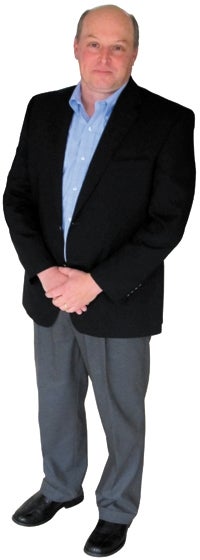Dr. Joseph Laning brings his scientific expertise and private-industry contacts to his new post as senior director of the Human Stem Cell Bank & Registry at the University of Massachusetts Medical School. He is charged with helping grow the bank and registry, which was created in 2008 as part of the state’s $1 billion life sciences initiative. Stem cells can be transformed into many different types of cells and their flexibility makes them ideal candidates for life-saving research. The bank and registry has three main goals: train people in the scientific industry on how to use stem cells, serve as a registry of stem cell lines throughout the world and bank stem cell lines to make them available for research purposes. Here, Laning discusses why he decided to take this new position and what made him fall in love with lab research.
>> What attracted you to this position?
I think first and foremost the position had a lot of details to it. There’s a lot of duck paddling: it’s very calm on the surface, but there’s a lot to it. The more I talked to people about it, the more I appreciated the different facets that would go into making a facility not just run but be successful.
>> Do you have any benchmarks for progress?
I think there’s a little bit of negotiation still going on there, but we’re looking to have significant progress toward sustainability within a year and I would say in 2012 that we would be self-sufficient.
>> And when you say self-sufficient, what do you mean? Does that mean operating without any state support?
I don’t know if that’s going to be true or not. I do know that a multi-faceted approach will be needed where we’re going after joint venture funding between us and industry, grant funding, foundation support. Obviously the sale of cells to investigators is part of that model. There are a lot of different revenue streams that would come into play. The no-stone-unturned philosophy is going to work well for us in the future.
>> What’s your day-to-day like?
Some of it is operational, in terms of understanding where we are with different cell lines, and quality control. It also includes dealing with incoming provenance paperwork for new cell lines and recruiting new cell lines from specialized investigators. I’m also having conversations with numerous entities including the Harvard Stem Cell Institute about cell lines and their business models and how they’re working to be self sustainable. I’m really pushing my industry contacts.
>> You previously worked in private industry at a small biotech company called ViaCell. This is an academic setting. What’s that transition been like for you? What are the differences?
Probably processes more than anything else, but I think that this is no different than if I were to go from ViaCell to Pfizer or some other big pharmaceutical company. I think the size is what makes it different, and certainly having the resources is very different as well. I always thought that it would be more different than it is.
>> Why hasn’t the private sector moved in to provide a similar service?
It’s a tough model. No matter how you slice cell banking, in any given industry, I think there are very few situations where you’ve seen it actually work. My former employer, ViaCell, was a viable version of that with their cord blood banking. But it took time to ramp to a point where it was self sustaining. Generally, there’s too much labor in the banking business, which makes it difficult to be a viable.
>> What’s the toughest management lesson you’ve had to learn?
What I’ve found difficult in the past is delegation. It’s about understanding the strengths of those around you and delegating accordingly so that you get the results that you need. I think it involves being a good judge of character and of the qualities and strengths of the people you work with.
Laning on what he likes most about his job:

